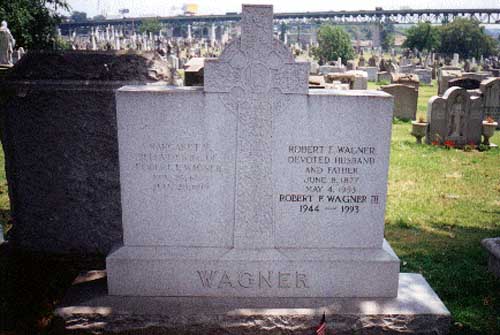Erik Visits an American Grave, Part 67
This is the grave of Robert Wagner.
Born in Prussia in 1877, Robert Wagner immigrated to the United States with his parents in 1885. Settling in New York, Wagner proved himself a rapidly rising star in Democratic Party politics from a young age. Graduating from City College in 1898 and New York Law School in 1900, he entered the state legislature in 1905 and then the state senate in 1909. He was president pro tempore of the body from 1911-14. Wagner became involved in reform causes to help the working class early in his career. He was Chairman of the State Factory Investigating Committee formed after the Triangle Fire that led New York to pass pioneering legislation on workplace and building safety. In that role, young reformers such as Frances Perkins showed Wagner just what life was like in the tenements and the sweatshops. He also worked to turn Tammany Hall away from its old corrupt past and into an organization that legitimately represented working Americans. In doing so, he was part of a larger movement remaking the northern wing of the Democratic Party in these years, a critical move in the coming New Deal. Wagner was that named to a seat on the state Supreme Court in 1919, staying there until 1926.
Wagner was elected to the Senate in 1926. A close ally of his old friend Franklin Delano Roosevelt, Wagner would become the greatest friend the American labor movement ever had in the Senate. Most importantly was the National Labor Relations Act, commonly known as the Wagner Act, that provided the critical framework of labor law that gave workers real rights in the United States for the first time in American history. He also shepherded the National Industrial Recovery Act of 1933 and the Wagner-Stegall Housing Act of 1937 through the Senate. In addition, he helped write the Social Security Act and introduced it to the Senate. He sponsored anti-lynching legislation that could never pass because of southern domination of the Democratic Party, but nonetheless was the right thing to do. Wagner was part of FDR’s brain trust and really far ahead of most of the Senate on a number of issues, including foreign policy, where he supported intervention at a time when isolationism was still dominant. He co-sponsored a bill in 1939 to admit 20,000 Jewish children from Germany to the U.S. Congress rejected it.
Wagner resigned from the Senate due to poor health in 1949 and died in 1953.
Robert Wagner is buried in Calvary Cemetery, Queens, New York



